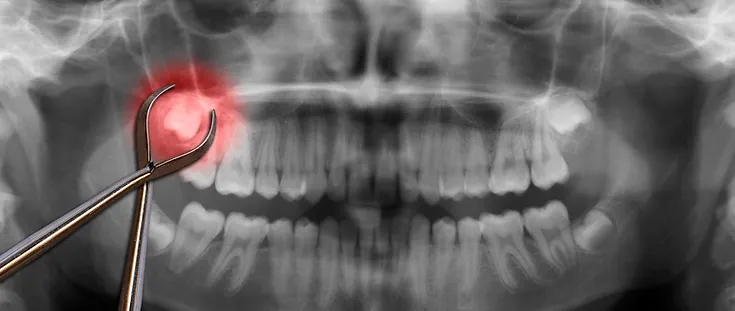
Wisdom Teeth Removal in Jerusalem
No Worries, We've Got You Covered
The wisdom teeth are the last teeth to erupt into the oral cavity and are supposed to erupt around the ages of 18-20, but in 70-80% of cases, due to crowding and lack of space in the jaw, wisdom teeth become impacted, unable to fully emerge into the oral cavity, leading to inflammation and potential damage to neighboring teeth in some cases. Additionally, due to their posterior location in the jaw, lower wisdom teeth are often close to the nerve canal, and upper wisdom teeth are in proximity to the maxillary sinus, making their extraction a complex procedure with potential risks of sensory impairment in the lower lip or sinus complications.
Extraction of impacted wisdom teeth is considered a complex surgical procedure in many cases and requires highly skilled surgical techniques.
The process of extracting an impacted wisdom tooth:
Initial Evaluation: An oral and maxillofacial surgeon evaluates the patient and performs a clinical assessment along with X-rays or CT scans to determine the most appropriate extraction method.
Preparing for Surgery: In some cases, pre-operative preparations may be necessary, such as taking antibiotics, adjusting current medication regimens, or performing blood tests before the procedure.
Surgical Procedure: The treatment begins with local or general anesthesia. The surgeon makes incisions in the gum tissue to expose the tooth and surrounding bone. Special instruments are used to carefully remove the bone that is blocking the tooth and to divide the tooth into sections if needed, allowing for safe removal.
Suturing: After the tooth is extracted, the surgeon may close the incision with sutures to promote proper healing and prevent infection. Sutures may dissolve on their own or require removal during a follow-up visit, depending on the case.
Post-operative care after wisdom tooth extraction:
- Swelling: Swelling in the cheek area is expected after the extraction and usually peaks within 48 hours, taking about a week to subside.
- Diet: Patients should avoid eating for the first two hours after the extraction and then consume soft and liquid foods for a couple of days.
- Cold Compresses: Applying cold compresses to the cheek in the surgical area can help reduce swelling in some cases.
- Pain Management: The surgeon may prescribe pain relievers to manage post-operative pain. Patients should follow the recommended dosage to avoid unnecessary pain.
- Oral Hygiene: Maintaining good oral hygiene is essential after surgical procedures to prevent infection in the surgical area.
- Mouth Rinses: The surgeon may recommend a special antiseptic mouth rinse after the procedure to keep the mouth free from bacteria and prevent infections.
- Follow-up: Patients will typically have a follow-up appointment after a week to monitor the healing process.
Is it necessary to extract wisdom teeth, or can they be left alone?
Leaving impacted wisdom teeth untreated is a mistake that can lead to unnecessary complications. Impacted wisdom teeth are associated with an increased risk of complications, recurrent infections, and potential damage to adjacent teeth. Extracting impacted wisdom teeth is usually recommended sooner rather than later to prevent the development of additional problems.
Why choose Dr. Blal for wisdom tooth extraction?
Extraction of impacted wisdom teeth is a delicate and precise surgical procedure that can pose potential complications. Having the procedure performed by an experienced oral and maxillofacial surgeon like Dr. Blal, with over 20 years of experience in the field, can help ensure the best possible outcomes and minimize unnecessary risks.

Why choose an oral and maxillofacial surgeon for wisdom teeth extraction?
Extraction of impacted wisdom teeth is a surgical procedure that requires a high level of skill and knowledge. Due to potential risks such as infection, nerve damage, or damage to adjacent teeth, choosing a specialized oral and maxillofacial surgeon is critical for successful outcomes.
Opting for an oral and maxillofacial surgeon is non-negotiable.
An oral and maxillofacial surgeon is a doctor who has completed intensive five-year specialized training in surgery. This advanced training, unique in its complexity of the anatomy of the mouth and jaws, makes them the most skilled professionals for performing this surgical procedure.
Comprehensive care, from diagnosis to recovery
An oral and maxillofacial surgeon can provide an accurate diagnosis regarding the need for extraction and the appropriate approach to perform it.
Advanced surgical skills
Oral and maxillofacial surgeons are capable of performing the surgical procedure with minimal discomfort for the patient.
Prepared for unexpected complications
Oral and maxillofacial surgeons are the most qualified professionals to efficiently and successfully handle any possible complications that may arise during or after the procedure, ensuring optimal results.
With extensive experience in oral and maxillofacial surgery, choosing a specialist ensures that you make an informed decision about your oral health. Selecting an experienced surgeon with a rich background in wisdom teeth extractions guarantees the best possible outcome, from the initial evaluation to post-operative care.
